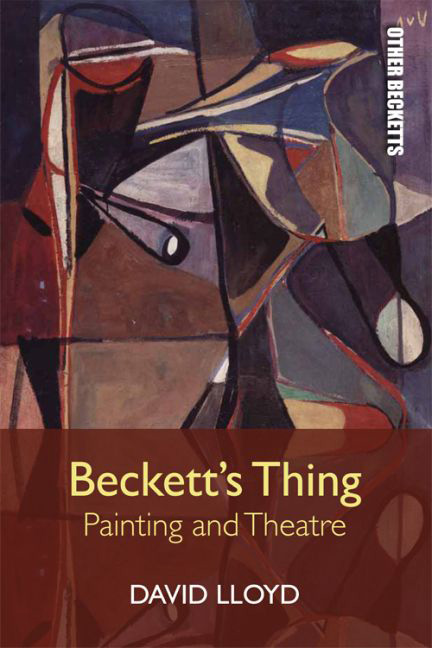Book contents
- Frontmatter
- Contents
- List of Figures
- Acknowledgements
- Other Becketts: Series Preface
- Introduction: The Painted Stage – Beckett's Visual Aesthetics
- 1 Republics of Difference: Yeats, MacGreevy, Beckett
- 2 Beckett's Thing: Bram van Velde and the Gaze
- 3 ‘Siege laid again’: Arikha's Gaze, Beckett's Painted Stage
- Conclusion: The Play's the Thing
- Bibliography
- Index
2 - Beckett's Thing: Bram van Velde and the Gaze
Published online by Cambridge University Press: 10 May 2017
- Frontmatter
- Contents
- List of Figures
- Acknowledgements
- Other Becketts: Series Preface
- Introduction: The Painted Stage – Beckett's Visual Aesthetics
- 1 Republics of Difference: Yeats, MacGreevy, Beckett
- 2 Beckett's Thing: Bram van Velde and the Gaze
- 3 ‘Siege laid again’: Arikha's Gaze, Beckett's Painted Stage
- Conclusion: The Play's the Thing
- Bibliography
- Index
Summary
Above all, let Bram not get the idea that I'm moving away from him. The very reverse. The farther I sink down, the more I feel right beside him, feel how much, in spite of the differences, our ventures come together in the unthought and the harrowing. And if there had to be for me a soul-mate, I make bold to say that it would be his soul and no other…. Bram is my great familiar. In work and in the impossibility of working. That's how it will always be.
No consideration of the peculiar version of republicanism that finds its articulation in Jack B. Yeats's painting, and which, as we have seen, Beckett seems to approach in his understanding of that work, can ignore the embeddedness of the notion of the thing in the term ‘republic’ itself. The res publica is the people's thing, la chose du peuple, its matter or affair, what concerns it or that around which it gathers. But in the deontological version of republicanism that Yeats and Beckett seem to have embraced as the resistant residue of a disappointed nationalism, the thing of the republic is no longer a question of representation or expression. Their emphasis falls instead on the recalcitrance of both the human and the thingly to representation, a recalcitrance that Beckett finds set forth in Yeats's insistence on the absolute separation both between humans and between the human and the natural. That insistence would seem to imply, moreover, that what we call the human is itself also a dimension of the thingly once the ‘old relation’ between subject and object that establishes the subject in its relation to its objects has been dissolved. Unimaginable from the perspective of Ireland's post-colonial nationalism, such a dissolution is the very ground of Beckett's aesthetic as he articulates it in the 1930s. It entails at once the abolition of the subject of expression, a term that assumes an a priori interiority that issues in utterances that are consubstantial with it, and the subsumption of the object in whose representation by or for the subject that subject is established in its formal anteriority.
- Type
- Chapter
- Information
- Beckett's ThingPainting and Theatre, pp. 85 - 153Publisher: Edinburgh University PressPrint publication year: 2016



